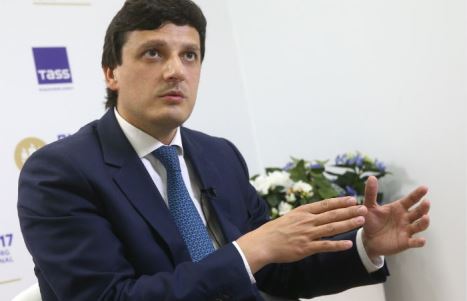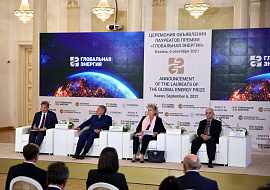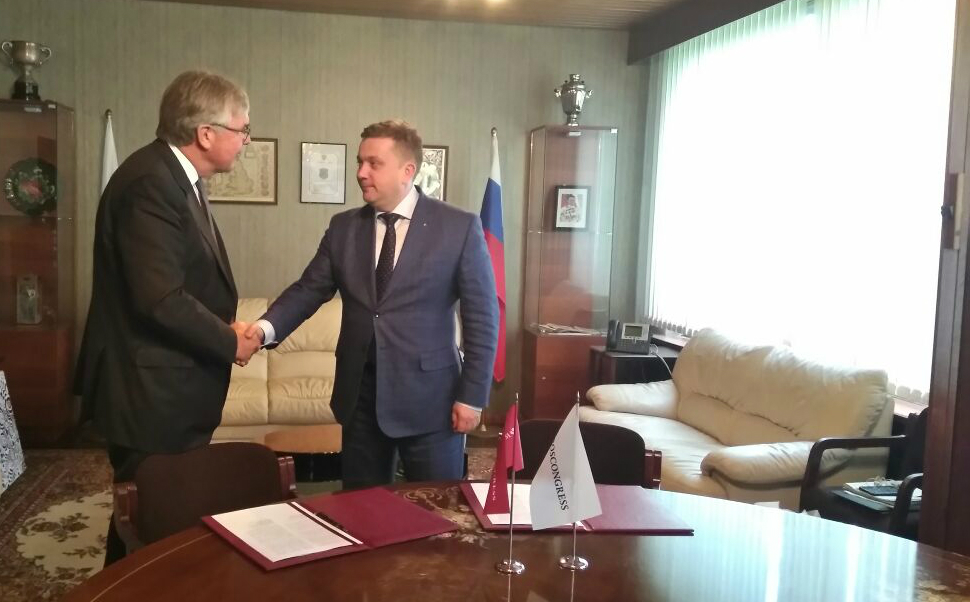“By tackling today’s challenges, we are shaping the future”

The 'Russian Energy Week' Energy Efficiency and Energy Development International Forum (REW), the successor to the ENES Forum, a highly popular event among its participants and visitors, will take place at the Manege Central Exhibition Hall in Moscow on 3–7 October. This year, the forum has not only taken on a new status and a new name (REW), but has also significantly expanded its scope: now along with issues concerning the electric power industry, discussions will also focus on the prospects for the development of such core sectors of the economy as the oil, gas, coal, and petrochemical industries. Deputy Chairman of the REW Organizing Committee and Russian Deputy Minister of Energy Anton INYUTSYN spoke with Power Industry News magazine about the goals and objectives of Russian Energy Week 2017.
Q: Anton, please explain what the transformation of the energy forum entails.
A: The prerequisites for this evolved within the framework of ENES. Over the four years of ENES, the forum’s areas and focuses had been steadily expanding: it dealt with issues not only concerning the electric power industry, but also the fuel and energy sector as a whole. Senior officials and focused specialists from both the electric power as well as the oil and gas industries got together on the sidelines of the forum. The forum’s agenda was packed full of international events. ENES demonstrated its sustainable effectiveness and popularity among its participants and visitors. At the same time, it became obvious that the forum had outgrown its scope and needed to be taken to a new level. In this regard, the Roscongress Foundation, which has extensive experience preparing major specialized events, got involved in the work, and a new format and new business programme were developed. The novelty is that we are focusing on a broader agenda and strengthening the international component, which has become extremely important in the context of the tense international situation.
One of the anchor events of Russian Energy Week will be the Gas Exporting Countries Forum, which will be held at two sites – in Moscow and St. Petersburg. The gas forum will be attended by 12 countries – the largest gas exporters and 4 observer countries. A new general secretary of the GECF organization will be elected here [the GECF is an association of the world’s leading natural gas exporting countries].
Q: How great has the interest been in the upcoming forum among potential participants?
A: I’ll start with the fact that the forum’s key theme this year will be ‘Energy for Global Growth’. In this case, the word ‘energy’ has a dual meaning: it’s both a resource that is necessary for the socioeconomic growth of any country as well as a person’s energy, which makes it possible to move scientific and technical progress forward.
During preparations for REW, we gathered the opinions of experts around the world and tried to highlight the most pressing issues that are of particular concern to the forum participants. As a result, according to preliminary data, roughly 500 companies and associations from 30 countries intend to take part in Russian Energy Week. And this is taking into account the international situation, which is quite challenging today. Russian Minister of Energy Alexander Novak has described REW as a key event for the Russian energy sector, and practice confirms this.
Q: What challenges do the domestic and global energy sectors face today? How ready are we to respond to them?
A: One of the key challenges involves technological breakthroughs in various energy sectors, which completely alter the conventional ideas about the extraction and use of traditional energy sources. In this regard, the balance of players is changing on global markets, economically unattractive reserves of raw energy materials are becoming profitable, and countries that import hydrocarbons and electric power are trying to become exporters. Markets continue to be globalized, while at the same time new active participants are emerging such as Iran and Brazil, among others.
The increasing availability of raw hydrocarbon materials is resulting in an increase in the number of consumer countries. The trade of liquefied gas is actively developing. It’s no coincidence that the United States attaches such importance to this type of business. The number of LNG importers has increased by 3–4 times over the past 20–30 years: whereas before only a dozen countries or so purchased liquefied gas, now the number is around forty.
Russia harmoniously blends into the picture of the modern energy world. We are actively engaged in developing our own technological base and we are implementing import substitution programmes. The introduction of sanctions against our country, including in the energy sector, proved to be a good impetus for more intense and serious work in this regard. It should be noted that, despite the intensified sanctions, Russia maintained its leading position around the world in terms of hydrocarbon production in 2016: we rank first in terms of oil (12.4% of the world volume), second in terms of natural gas (17.7%), and are also among the top five countries in terms of coal and electricity production.
Due to the fact that our country pays much attention to state regulation, attracting investors, and stimulating new technologies, we are able to hold leading positions in the global energy market. Nevertheless, we take into account the increased competition and the growing activity of our partners, so we pay special attention to such new areas as the offshore extraction of hydrocarbons (which increased 18% last year), the extraction of hard-to-recover reserves, etc. Foreign companies show great interest in this work, so our industrialists have the opportunity to create alliances and joint ventures with foreign participation despite the sanctions, political pressure, and other artificial barriers.
Russia is broadly represented in the EAEU and the Asia-Pacific region and is intensifying ties via BRICS. By the end of 2017, we expect to be able to launch the energy platform of BRICS countries, which will make it possible to provide alternative forecasts for energy markets, verify them among our countries, and use them as a benchmark when implementing our policy.
A high level of energy cooperation has been achieved with China, which is stimulating the development of energy infrastructure in the Far East. We have a number of large-scale high-tech projects with Japan, South Korea, and India. So we continue to develop mutually beneficial relations with our nearest neighbours on a new technological basis, expand our horizons, and involve more new countries in cooperation.
Here I would like to stress: we are not confining ourselves to major transactions. Horizontal communication is developing dynamically – at the level of the regions and individual companies. Many small, local energy projects are being implemented – at the level of districts, villages, and companies. Incidentally, foreign investors and partners have shown great interest in “small” forms of work. For example, Japan is involved in the development of wind generation in the Far East. Foreign investors are highly active in projects in mini power generation, smart power systems, lighting, etc. During REW, we plan to organize a panel discussion on energy supply to remote territories. In Russia, some 20 million people live in such regions. We have a clear understanding and specific decisions on the issue of how to create new infrastructure and improve the living standards of our citizens without lowering the quality of service.
I would like to add that we are interested in implementing projects not only in our country, but also abroad. Russian energy companies operate in different countries around the world. This is also important because by tackling today’s challenges, we are shaping the future.
Q: The energy efficiency of any economy depends on the level and quality of development of new technologies. What is happening in the Russian scientific and technological sector? Which areas are developing most actively? Which ones are not receiving the proper attention and why? How much is the Ministry of Energy able to influence the dynamics of scientific and technological progress?
A: There are a number of areas that are progressing quite dynamically. The Ministry of Energy keeps particularly strict track of them because they directly affect the social standing of society. Take a sector like lighting, for instance. In Russia, indoor and outdoor lighting accounts for 13% of all the electricity produced in the country, i.e. every sixth kilowatt-hour is spent on lighting. This is a huge market. Over the past five years, our country has created clear conditions for the establishment of a market for modern energy-efficient lighting sources (above all, LED devices). A legal framework has been developed in accordance with which all state and municipal unitary enterprises and other state organizations are required to purchase only LED lamps for their own purposes. Organizations with regulated activities are required as part of their development programmes to increase the share of LED lamps to 70% by 2020. We have amended a number of documents related to design. Now new buildings and structures may only be built using LED energy-saving lamps (in common areas). As regards urban lighting, the mandatory use of LED lamps will also be required starting next year.
The organizational and legislative work that has been carried out has produced results: whereas in 2012 the market share of LED lamps was only 2%, today it has increased to 25%, a ten-fold increase.
Q: Is Russia producing LED lamps of its own?
A: Of course. It’s another matter that some components are imported from abroad because that’s cheaper than producing them ourselves. I will say another thing: over the past five years, the price of a LED lamp has decreased by more than 66%: where when the market was first established the price was RUB 700 per lamp, now it’s RUB 150-200. And there is room for a further decrease. According to our calculations, the cost of a lamp can be reduced by another 50–66%. For example, in India it costs USD 1–1.5.
Q: What are the priorities in other sectors of the fuel and energy industry?
A: A certain breakthrough has been made in oil refining. Thanks to the development and introduction of new technologies in recent years, the depth of oil refining in Russia has increased from 70% to 92%, and is as high as 98% at enterprises in the Perm Territory! This all makes it possible to expand the range of exported goods. We plan to complete the modernization of all Russian oil refineries in the near future. Meanwhile, today 93% of the gasoline produced is of the highest fuel class – class 5 – and meets all European and international standards. Today, we can say that Russian motorists are using the highest quality and eco-friendly fuel. Class 5 reduces harmful emissions by 50–60%.
We continue to work on using natural gas motor fuel on vehicles. To be fair, we must admit that the strongest competitor for petrol is electricity. It’s easier and cheaper to produce charging infrastructure for electric vehicles than a network of petrol stations. In addition, there are markedly different requirements for the safety, content, and use of petrol filling stations and electric stations. Nevertheless, we believe that both types of refuelling infrastructure need to be developed. Experience shows that it is preferable for cars and urban transport to use an electric motor, while natural gas motor vehicle is more suitable for long journeys, municipal equipment, etc., for example.
Energy specialists face major challenges in the renewable energy sector: 9 GW of capacity are to be introduced by 2025. At the same time, roughly 9 GW of inefficient production facilities will be decommissioned by 2020 and be replaced by new high-tech facilities, including digital ones. At present, Yantarenergo is implementing a pilot project in the Kaliningrad Region to introduce integrated smart and digital control system.
For the time being, we are unable to introduce new technologies everywhere because they are quite expensive. But we are doing everything we can to establish a reliable base to further develop and make new technologies and innovative products cheaper. In other words, by tackling today’s challenges, we are shaping the future.
Q: How does Russia look on the world stage in terms of the development and introduction of new technologies in the fuel and energy industry? How productive is our school of science?
A: In this regard, it would be more correct to speak about each specific industry separately and not about the fuel and energy sector as a whole. In some areas we have notable achievements, while in others there are obvious shortcomings.
We maintain the leading global positions in terms of technology development in the gas industry. The projects that Gazprom is implementing at the Bovanenkovskoye field, or NOVATEK in Yamal, are unique in their own right and require unique technologies. They have to equip wells, lay gas pipelines, and extract minerals in the conditions of the Far North, where there is permafrost, a severe climate, low temperatures, and very fragile nature. Only the joint activities of scientists, engineers, designers, builders, fishermen, etc. have made it possible to create technologies that allow for implementing projects that until now had been considered impossible.
Or take an oil pipeline in the Arctic. Pipes are laid in permafrost with unstable soils and difficult climatic conditions. Given these and other natural nuances, our engineers have created such designs and materials that don’t exist anywhere else in the world.
Unique projects are being launched in the electricity sector. Power plants in Yekaterinburg and Chelyabinsk operate in full automated mode (with minimal human involvement). It’s an entirely new philosophy for power generation and grid management. Residential micro-districts have been built for these plants (for example, the Akademichesky micro-district near Yekaterinburg) in which all smart technologies have been fully integrated in the electric power industry as well as housing and utility services.
It is important to note that many of the unique technologies that have been created in the process of implementing fuel and energy industry projects are then widely used in other industries – space, defence, transport, healthcare.
At the same time, I would like to add that we still have enormous potential for the development of technologies, primarily in the electric power industry as well as in the oil and gas industry.
Q: The forum will not only be attended by fuel and energy sector workers, but also by representatives of the federal and regional authorities as well as financial and other business structures. What does a dialogue with them offer power industry officials?
A: To begin with, we are expecting many guests at this forum. This year, the forum will host a summit of mayors from both Russian and foreign cities. It will be attended by about 50 mayors from Russian cities and roughly the same number of foreign mayors. The summit’s theme is ‘Introducing New Technologies for the Sustainable Development of Energy Systems of Major Cities’. As you know, large cities are the biggest consumers of electricity: today they account for 70% of global consumption. And this shift in consumption towards large cities will increase to 85% by 2035. Consequently, we understand that energy in major cities will become a key infrastructure component that ensures a city’s development and functioning. Cities pay great attention to this issue. It is essential for all of us to understand how territories develop. That’s why discussions of trends, solutions, and an exchange of experience are planned for REW.
Russian Energy Week will also feature a meeting on preparations for the autumn-winter peak period. There will be numerous platforms for communication among focused specialists (so-called ‘interest clubs’), where power industry engineers will be able to discuss issues they understand and are curious about. Newspapers and magazines don’t usually write about the work of such clubs, or interest groups, but this is an extremely important component of the forum and a beneficial experience for energy company employees.
Q: Last year’s ENES Forum has an extensive youth programme. Is something similar planned for this year?
A: Yes. The forum’s penultimate day will be fully devoted to young people. Awards will be presented on this day to participants in the national #BrighterTogether competition, which is very popular among young people and energy companies. This year the competition was held in 77 regions of the country.
The goal of all the events is to generate interest among young people and reveal the unknown horizons of the profession. For power companies, it’s an excellent means of communication, which allows for taking a closer look at who will be coming to the power industry in three to five to ten years. This is an opportunity to see what our energy sector will be like tomorrow.
Interview by Lyudmila YUDINA
Source: https://minenergo.gov.ru/node/9117





